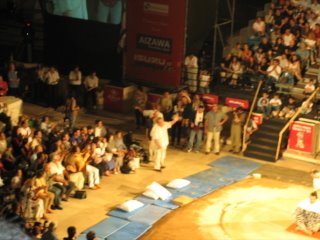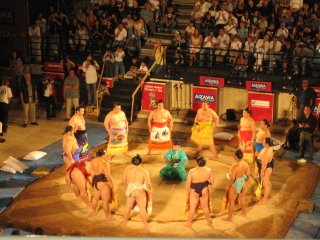Yesterday, I witnessed the fruits of this man’s imagination at the Japan Sumo Masters Series event in the Roman Amphitheater in Caesarea (a site whose history dates back to before the origins of sumo) on the shores of the Mediterranean. (I want to know how many people died competing in gladiator events at this site and whether Maximus ever showcased his talents here on his comeback trail)

Before I offer my observations of one mankind’s greatest cultural events (right next the Malka and Elimelech Kugelov Kugel-off), let me tell you that Caesarea is the most difficult, large-ish city to get to from Jerusalem. We had to take a bus from Jerusalem to Tel Aviv, then a train from Tel Aviv to Caesarea, and a taxi to the amphitheater (just wait until the end of the night for how I got back to Jerusalem).
After we got to the site, we realized that the entire Japanese community in Israel has descended on this event. And if you have never heard a Japanese-Hebrew accent before, it’s very interesting. In fact, one of those very nice Japanese Israelis took this picture.

Now, I have too many observations to make, so I will start……….. now.
Before I give you my thoughts, I will lay out some ground rules (they also apply to sumo).
• No pulling of the hair
• No poking eyes
• No punching in the face.
I guess I lied before. My observations will start now.
The first thing that we saw was a man on top of the stadium playing a giant traditional drum.
Thirteen wrestlers from the Sadogatake Stable (I thought that stables were found in Kentucky for training and breeding horses) traveled to Israel as part of the mission. They live together in these “stables,” honing their skill under the tutelage of Hamato Yoshi for the day they can face off against his former master Oroku Saki. From what I surmise, sumo wrestlers live in stables and ninjas in dojos.
For those familiar with the film Beverly Hills Ninja, you know about the Legend of the Great White Ninja (One day, a white ninja will appear that will become the greatest ninja of all time. It turned out to be Chris Farley.). Apparently, there is a similar legend in sumo because the top competitor is from Bulgaria, which raises the question of how a Bulgarian child is recognized by a stablemaster for his sumo potential. Which raises the even-more pressing question of how sumo talent is measured, scouted, and recruited? Is there a Tom Lemming of sumo wrestling who tracks the recruiting process scours through databases of names or do the masters just go to a fast food restaurant and pick up fat kids?
As is traditional with sporting events, the night began with the national anthems of both countries. Oddly, the first time I sang Hatikvah in a communal setting in my three weeks in Israel was at a sumo wrestling competition.
After the national anthems, there was a brief explanation of sumo rules and traditions. Did you know that there is a special ritual regarding how the wrestlers hair is supposed to be straightened and braided? The organizers of the event felt that it was necessary for a fifteen-minute demonstration of this? Which raises the question of whether the sumo hair stylist has another job in the stable (I pose the same question about the ritual drum player or did they pick somebody up off the street to do that?) How does one become a sumo hair stylist? Are they wrestlers that didn’t pan out or are do they have their own stylist stables where they train?
At the end of the hair styling, the sumo bowed to his hair stylist? Would you do that? It must be a cultural thing.
After the wrestler got his hair done in the middle of the arena, a group of Israeli kids from an Israeli sumo club (I think) dressed in sumo diapers came out for exhibition matches against the sumos (I took a video with my camera, you can watch it here). This ranks in the top 20 funniest things that I have ever seen. If you ever get the chance to watch a kid try to wrestler someone about five times his size, take advantage of it. The kids tried as hard as they could to push the wrestlers out of the ring, but they wouldn’t budge. Then, with a flick of the hand, the kids would be on the ground or in the third row of the stands. At times, I questioned the legality of how the wrestlers were treating the kids. By the end of the exhibition, it was ten kids going up against one sumo wrestler. The kids managed to get him out of the ring but I believe that the match was rigged. The sumo didn’t event try.

After the kids, there was a karate demonstration. Is this normal at sumo events or did the organizers think “this is the highest profile Japanese cultural event that will ever come to Israel, we better find a way to incorporate the Israeli karate scene? The two highlights of this included a guy breaking 11 concrete brick tiles with his palm (he did set up 12 bricks, so I was slightly disappointed) and another guy breaking a wooden board by hitting another guy with it in the hip.
There was a young couple sitting behind us at the amphitheater: an Israeli guy with a Japanese girl. This was the perfect date night for a couple like this.
I’ve been a Kotofugu fan since the day I was born. My parents contend those were my first words.
Did you ever hear of the Jewish sumo wrestler Santiharo Koufazuki? He chose to observe Yom Kippur instead of competing in the opening day of competition of the biggest event of the year? He returning to competition that night just after break fast (with his digestive system completely out of sorts) and won the competition to be named Yokozuna. (I made that story up.)
The crowd of about 3,000 strong was graced with the presence of sumo master and the 53rd Yokozuna Kotonawaka (Yokozuna is world champion). He sat in a wheelchair in the front row. Every time the action switched to a different section of the floor, they would rotate his wheelchair so that he was facing the action.

How you treat a false start in sumo. Is there some sort of five-yard penalty? Actually, it turns out that it is simply a redo. But, while we are thinking of football, do you think that any linemen ever seriously considered switching to sumo or vice versa. Could you imagine Lloyd Carr taking recruiting camps to stables in Japan in search of the next Steve Hutchinson?

While watching a sumo match, I learned the proper word to yell out is Gambare pronounced: Gom-bar-ay). It is the Japanese equivalent of “knock that 300-pound guy on the mat or out of the ring.”
Did you know that the Japanese were the first people to have an on-deck circle? In fact, they one up baseball by also providing facilities for the person that is “in-the-hole.” Just outside of the ring, on both sides,, there are three pillows set up. The one in the middle is for the judge, which the other two are for wrestlers waiting to compete.
At the beginning of every match, there is the ceremonial throwing of salt on the ring for purification. It is also a way for the wrestlers to build up tension. If they don’t think that it is pure enough, they back out there stances, regroup, and throw more salt on the ring. It is like a pitcher delaying just to unnerve the batter. He can call time to regroup. Sometimes, a wrestler gets a little peeved at the other one and gives him a little staredown when he goes to get salt from the corner. Also, a wrestler can show his emotion by picking up a lot of salt and tossing it emphatically.
Do their bathrooms have to be equipped with special toilets? Do they have to outfit airplanes especially for them as well?
The Bulgarian ended up winning the competition. He only lost one match the entire tournament. But the biggest takedown of the night was when Kotominsky’s over the back throwdown of Shokiku in the final round. It was a special night the Bulgarian because he parents were able to travel to the tournament.
Sumo is one sport that would not be allowed at Jewish high school. There is not modesty. Why is it all right for 300-pound wrestlers to walk around in that little clothing, but it’s weird if other people do it? Actually, it’s weird if anybody does it. Just a side note: Some of the wrestlers weighed as many kilograms as I do pounds, which means there are 2.2 Ians in some of the wrestlers.

Now, I promised that I would tell you how I got back to Jerusalem after the wrestling. We asked the security guards and they told us to take the bus. Fine. So we called the bus company at 11:02. Their customer assistance line closes at 11:00. There is no computerized help either. We ask the security guards what would be another way to get back. They suggested tremping (hitch hiking). If I was alone, I wouldn’t tremp, but because there were two of us, we felt safer. We stood outside the gate to the amphitheater for 15 minutes as thousands of cars poured out, nobody stopped. Then we got a ride with two people, about our age, to the gas station a few kilometers up the road.

This restaurant was at the gas station a few kilometers down the road. Too funny.
At the gas station, we met a TV reporter and cameraman. They said they could give a ride back to Tel Aviv, which was all we could’ve hoped for. I don’t know what we would’ve done if we didn’t find this TV crew (probably overpaid a taxi back to Tel Aviv).
8 comments:
Bossanova, Chevy Nova!
hilarious video!!!! and the writing was pretty good too.
Doesn't the JP want this for their newspaper?
what language was the tournament conducted in? engrish? ivrit? japanebrew?
Rhat ranguage was the wrestring competition in?
Werr, that is an interesting question. The organizers of the competition seemed to think that everybody in the crowd was fruent in arr three ranguages. They fert it was acceptabre to switch between the ranguages without any announcements. Rearry, rearry interesting, if you ask me.
i'm sill laughing.
Do you think Rome would read this/
i'm sill laughing.
Do you think Rome would read this on his show?
A couple of my friends just came back from watching 8 hours of Sumo Wrestling competition in Japan, and their findings were similar to yours: that Bulgarian is no joke!
Nice to have their observations verified by a reliable third party/source--a reporter, nonetheless!
Enjoy the rest of your stay.
Regarding the ranguages, I hope Ari told you about our discussion of how an asian person would speak hebrew. I find the best way to picture this is to sing a few lines of your favorite hebrew song with l-to-r replacement. Priceress.
Post a Comment